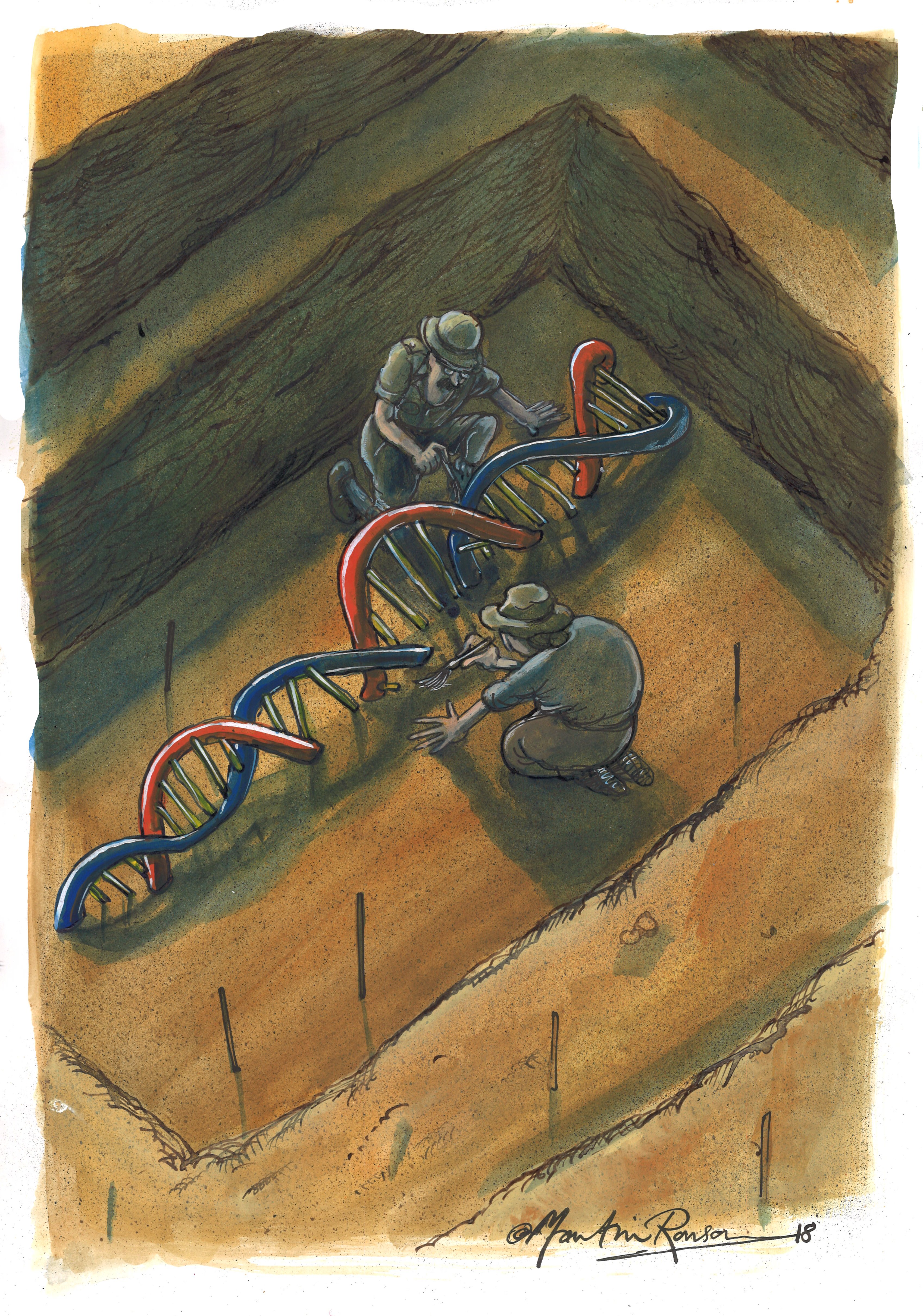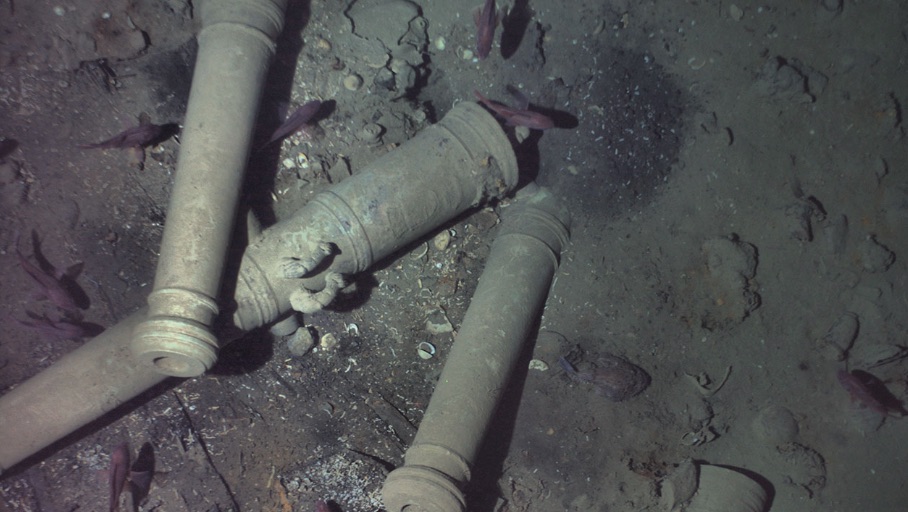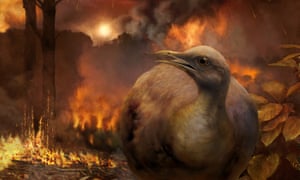via Eurozine by Peter Forbes

Image: Copyright Martin Rowson; used with author’s permission
The study of prehistory – roughly everything before 5,000 years ago – began by grubbing in the earth for the remains of settlements and goods and bones and fossils. Before that, there was the geological record with a time frame crudely assessed by comparing strata and estimating sedimentation rates. All this changed with radioactive dating, invented by the great physicist Ernest Rutherford in 1905. First, it impacted geology, giving us an accurate time frame for the history of the earth, and then for the fossil record of early Homo sapiens, now dated to around 300,000 years ago. In 1949 came radiocarbon dating, which gives us a date for when living things died. Although it is effective for only up to 50,000 years, it revolutionised the study of the more recent past. Archaeologists had dates for their settlements, pots and ancient human samples.
Continue reading
==============================
via the New Statesman by David Dabydeen

A 16TH-CENTURY PORTRAIT OF AN AFRICAN MAN BY JAN MOSTAERT
Scholarship on the historical black presence in Britain tends to dwell on the 18th century: the era of the slave trade, a consequence of which was the huge number of black people brought to Britain to work for aristocrats, merchants and anyone rich enough to buy such people at public auctions held in taverns and coffee houses. The documentation of their lives is plentiful, enhanced by the testimonies of former slaves such as Olaudah Equiano and Ottobah Cugoano.The rise of great cities such as Liverpool and Bristol can also be linked to the revenues from slavery. David Olusoga, Nick Draper and others have unearthed thousands of British individuals and families who benefited from investments in the African body. No account of the social and economic development of 18th-century Britain is complete without recognition of the contribution of Africans enslaved in Britain and the Caribbean.
Miranda Kaufmann’s book, however, reaches back further to tell the stories of black Tudors. It is not only groundbreaking, but also a gripping set of portraits of ten Africans, selected from the hundreds discovered through patient searching through parish registers of baptisms, marriages and burials; municipal records; tax returns; wills and inventories; household accounts and other miscellaneous, often obscure or overlooked archival materials. As Kaufmann writes, “no one has yet trawled the entire corpus of 16th- and 17th-century documents” for evidence of the black presence. There are, for example, nearly a million probate inventories that survive for the period around 1580-1720. “These lists of objects, from livestock to armour, chamber-pots to musical instruments, provide an intimate insight into the daily lives and material culture of ordinary people.”
Continue reading
==============================
via Arts & Letters Daily: David N. Smith in Jacobin

George Orwell was born 115 years ago today [25 May 2018]. He is often remembered as a paragon of lucidity and truth-telling. But he was also deeply serious about socialist politics.
George Orwell was serious about politics.
That might seem obvious, given the pervasively political valence of “Orwellian” discourse and the politically charged touchstones of Orwell’s famous novels, the Bolshevik revolution in Animal Farm and totalitarian thought control in Nineteen Eighty-Four. But the degree to which Orwell was steeped in the crosscurrents of radical politics has been routinely underestimated. So much has been said about Orwell’s legendarily plain speech and his free-thinking worldview that he now figures, for many, as an icon of non-doctrinaire and even anti-doctrinaire thought.
Continue reading
==============================
via the Big Think blog by Scotty Hendricks
Trying to understand the arguments of a person whose worldview is opposed to yours is often an exceedingly difficult task. In our ever more diverse and interconnected world, however, we must try. Here, we’ll examine the radical views of a brilliant mind, to help show you how it can be done.
Who was Oscar Wilde?
Oscar Wilde was one of the greatest authors of the late 19th century. A poet of the highest order, he wrote several works which are still widely read today, including The Picture of Dorian Gray and The Importance of Being Earnest. His wit and humor are legendary, as is the story of his fall, decline, and death.
Being a poet, Wilde was remarkably in tune with the social problems of his age. His proposed cure to the various ailments of Victorian England was a radical socialism which had only been tried for short periods before. His arguments are abstract, and he makes only passing mention of financial details. However, they are still worth considering—if only to help us understand how a revolutionary mind works.
Continue reading
==============================
via Interesting Literature
In this week’s Dispatches from The Secret Library, Dr Oliver Tearle revisits Mary Shelley’s misunderstood parable and founding text of science fiction
Frankenstein is one of a handful of nineteenth-century fictional creations that went truly global and became ingrained in the popular consciousness. Along with Sherlock Holmes and Dracula, Mary Shelley’s character has flown free of the text which spawned it: Frankenstein has become synonymous with biological experimentation, the creation of hybrid ‘monsters’, and the perils of playing God. The Oxford English Dictionary includes the prefix ‘Franken-’, used to denote nouns implying genetic modification, most famously ‘Frankenfoods’. The OED also records ‘Frankenstein’ itself, in extended use, as both a noun and a verb.
Continue reading
==============================
via Boing Boing by David Pescovitz

In 1708, British ships sunk a Spanish galleon called the San José that contained a cargo of gold, silver, and emeralds believed to be now valued at billions of dollars. Now it's been revealed that in 2015, a robot found this "holy grail of shipwrecks" off the coast of Cartagena, Colombia. The efforts were led by Maritime Archaeology Consultants with Woods Hole Oceanographic Institution scientists using an autonomous underwater vehicle named REMUS 6000.
Continue reading
==============================
via the Guardian by Hannah Devlin and agencies

Perching birds became extinct because the world’s forests were destroyed. Photograph: Phillip M Krzeminski/University of Bath
Birds had to rediscover flight after the meteor strike that killed off the dinosaurs, scientists say.
The cataclysm 66m years ago not only wiped out Tyrannosaurus rex and ground-dwelling dinosaur species, but also flying birds, a detailed survey of the fossil record suggests.
As forests burned around the world, the only birds to survive were flightless emu-like species that lived on the ground.
“Looking at the fossil record, at plants and birds, there are multiple lines of evidence suggesting that the forest canopies collapsed,” said Regan Dunn, a member of the team from the Field Museum in Chicago, US. “Perching birds went extinct because there were no more perches.”
Continue reading
==============================
via the OUP blog by Dennis Sherwood

Colour by rawpixel. Public domain via Pixabay
It’s nearly 60 years since C.P. Snow gave his influential “Two Cultures” lecture, in which – among many other significant insights – he advocated that a good education should equip a young person with as deep a knowledge of the Second Law of Thermodynamics as of Shakespeare. A noble objective, but why did Snow highlight this particular scientific law? There are many others – such as those associated with Newton or Einstein – that are more well-known. Isn’t the Second Law of Thermodynamics rather obscure?Well, unless you happen to be a full-time hermit, living in total isolation, then you experience the Second Law much more frequently than you might realise.
Continue reading
==============================
via About History by Alcibiades

The Ionian revolt lasted from 499 to 493 BC. It was an uprising of Greek cities in Ionia (Asia Minor) against the Persian Empire, and was the beginning of the Greco-Persian Wars. The uprising was caused by discontent among the inhabitants of the eastern coast of the Aegean Sea and Cyprus under the rule of the Persians. The initiators of the uprising were tyrants from Miletus, Histiaeus, and Aristagoras. Initially, the rebels were fortunate and won a number of victories. However, in the end, the Persians completely suppressed the insurrection.
Continue reading
==============================
via Interesting Literature
‘The Passionate Shepherd to His Love’ is Christopher Marlowe’s most widely anthologised and best-known poem (he also wrote plays, including The Jew of Malta and Dr Faustus, which would influence Shakespeare’s early plays). A classic of the pastoral tradition of English poetry, ‘The Passionate Shepherd to His Love’ deserves closer analysis because it contains so many features of pastoral verse and, in many ways, is the finest embodiment of the genre in English literature.
Continue reading
No comments:
Post a Comment